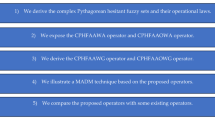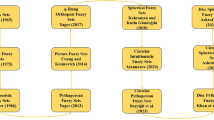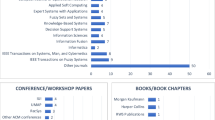Abstract
Due to the uncertainty of decision environment and differences of decision makers’ culture and knowledge background, multi-granular HFLTSs are usually elicited by decision makers in a multi-attribute group decision making (MAGDM) problem. In this paper, a novel consensus model is developed for MAGDM based on multi-granular HFLTSs. First, it is defined the group consensus measure based on the fuzzy envelope of multi-granular HFLTSs. Afterwards, an optimization model which aims to minimize the overall adjustment amount of decision makers’ preference is established. Based on the model, an iterative algorithm is devised to help decision makers reach consensus in MAGDM with multi-granular HFLTSs. Numerical results demonstrate the characteristics of the proposed consensus model.
Similar content being viewed by others
References
Cabrerizo, F. J., Al-Hmouz, R., Morfeq, A., Balamash, A. S., Martínez, M. A., & Herrera-Viedma, E. (2017). Soft consensus measures in group decision making using unbalanced fuzzy linguistic information. Soft Computing, 21(11), 3037–3050.
Cabrerizo, F. J., Chiclana, F., Al-Hmouz, R., Morfeq, A., Balamash, A. S., & Herrera-Viedma, E. (2015). Fuzzy decision making and consensus: Challenges. Journal of Intelligent & Fuzzy Systems, 29(3), 1109–1118.
Degani, R., & Bortolan, G. (1988). The problem of linguistic approximation in clinical decision making. International Journal of Approximate Reasoning, 2(2), 143–162.
Delgado, M., Herrera, F., Herrera-Viedma, E., & Martínez, L. (1998). Combining numerical and linguistic information in group decision making. Information Sciences, 107(1–4), 177–194.
Dong, Y., Chen, X., & Herrera, F. (2015). Minimizing adjusted simple terms in the consensus reaching process with hesitant linguistic assessments in group decision making. Information Sciences, 297, 95–117.
Dong, Y., Xiao, J., Zhang, H., & Wang, T. (2016). Managing consensus and weights in iterative multiple-attribute group decision making. Applied Soft Computing, 48, 80–90.
Dong, Y., Xu, Y., & Yu, S. (2009). Computing the numerical scale of the linguistic term set for the 2-tuple fuzzy linguistic representation model. IEEE Transactions on Fuzzy Systems, 17(6), 1366–1378.
Farhadinia, B. (2016). Multiple criteria decision-making methods with completely unknown weights in hesitant fuzzy linguistic term setting. Knowledge-Based Systems, 93, 135–144.
Guo, W. T., Huynh, V. N., & Sriboonchitta, S. (2017). A proportional linguistic distribution based model for multiple attribute decision making under linguistic uncertainty. Annals of Operations Research, 256(2), 305–328.
Herrera, F., & Herrera-Viedma, E. (2000). Linguistic decision analysis: Steps for solving decision problems under linguistic information. Fuzzy Sets and Systems, 115(1), 67–82.
Herrera, F., Herrera-Viedma, E., & Verdegay, J. L. (1996). Direct approach processes in group decision making using linguistic owa operators. Fuzzy Sets and Systems, 79(2), 175–190.
Herrera, F., & Martínez, L. (2000). A 2-tuple fuzzy linguistic representation model for computing with words. IEEE Transactions on Fuzzy Systems, 8(6), 746–752.
Herrera, F., & Martínez, L. (2001). A model based on linguistic 2-tuples for dealing with multigranular hierarchical linguistic contexts in multi-expert decision-making. IEEE Transactions on Systems, Man, and Cybernetics, Part B: Cybernetics, 31(2), 227–234.
Herrera-Viedma, E., Cabrerizo, F. J., Kacprzyk, J., & Pedrycz, W. (2014). A review of soft consensus models in a fuzzy environment. Information Fusion, 17, 4–13.
Kaufmann, A., & Gupta, M. M. (1991). Introduction to Fuzzy Arithmetic: Theory and Application. New York: Van Nostrand Reinhold.
Liao, H., Xu, Z., & Zeng, X. J. (2014). Distance and similarity measures for hesitant fuzzy linguistic term sets and their application in multi-criteria decision making. Information Sciences, 271, 125–142.
Li, C. C., Dong, Y., & Herrera, F. (2019). A consensus model for large-scale linguistic group decision making with a feedback recommendation based on clustered personalized individual semantics and opposing consensus groups. IEEE Transactions on Fuzzy Systems, 27(2), 221–233.
Li, C. C., Rodríguez, R. M., Martínez, L., Dong, Y., & Herrera, F. (2018). Personalized individual semantics based on consistencyin hesitant linguistic group decision making with comparativelinguistic expressions. Knowledge-Based Systems, 145, 156–165.
Liu, H., & Rodríguez, R. M. (2014). A fuzzy envelope for hesitant fuzzy linguistic term set and its application to multicriteria decision making. Information Sciences, 258, 220–238.
Martínez, L., & Herrera, F. (2012). An overview on the 2-tuple linguistic model for computing with words in decision making: Extensions, applications and challenges. Information Sciences, 207, 1–18.
Mendel, J. M., & Wu, H. (2007). Type-2 fuzzistics for symmetric interval type-2 fuzzy sets: Part 2, inverse problems. IEEE Transactions on Fuzzy Systems, 15(2), 301–308.
Morente-Molinera, J. A., Pérez, I. J., Ureña, M. R., & Herrera-Viedma, E. (2015). On multi-granular fuzzy linguistic modeling in group decision making problems: A systematic review and future trends. Knowledge-Based Systems, 74, 49–60.
Palomares, I. (2018). Large group decision making: Creating decision support approaches at scale. Cham: Springer.
Palomares, I., Estrella, F. J., Martínez, L., & Herrera, F. (2014). Consensus under a fuzzy context: Taxonomy, analysis framework afryca and experimental case of study. Information Fusion, 20, 252–271.
Rodríguez, R. M., & Martínez, L. (2015). Consensus model for group decision making with hesitant fuzzy linguistic information. In Proceedings of the 2015 international conference on intelligent systems and knowledge engineering, Taipei, Taiwan (pp. 540–545)
Rodríguez, R. M., Bedregal, B., Bustince, H., Dong, Y. C., Farhadinia, B., Kahraman, C., et al. (2016a). A position and perspective analysis of hesitant fuzzy sets on information fusion in decision making. towards high quality progress. Information Fusion, 29, 89–97.
Rodríguez, R. M., Labella, A., & Martínez, L. (2016b). An overview on fuzzy modelling of complex linguistic preferences in decision making. International Journal of Computational Intelligence Systems, 9(sup1), 81–94.
Rodríguez, R. M., & Martínez, L. (2013). An analysis of symbolic linguistic computing models in decision making. International Journal of General Systems, 42(1), 121–136.
Rodríguez, R. M., Martínez, L., & Herrera, F. (2012). Hesitant fuzzy linguistic term sets for decision making. IEEE Transactions on Fuzzy Systems, 20(1), 109–119.
Rodríguez, R. M., Martínez, L., & Herrera, F. (2013). A group decision making model dealing with comparative linguistic expressions based on hesitant fuzzy linguistic term sets. Information Sciences, 241, 28–42.
Torra, V. (2010). Hesitant fuzzy sets. International Journal of Intelligent Systems, 25(6), 529–539.
Wang, H., Xu, Z., & Zeng, X. J. (2018). Hesitant fuzzy linguistic term sets for linguistic decision making: Current developments, issues and challenges. Information Fusion, 43, 1–12.
Wei, C., Zhao, N., & Tang, X. (2014). Operators and comparisons of hesitant fuzzy linguistic term sets. IEEE Transactions on Fuzzy Systems, 22(3), 575–585.
Wu, Z., & Xu, J. (2016). Possibility distribution-based approach for MAGDM with hesitant fuzzy linguistic information. IEEE Transactions on Cybernetics, 46(3), 694–705.
Wu, Z., Yang, X., Tu, J., & Chen, X. (2019). Optimal consistency and consensus models for interval additive preference relations: A discrete distribution perspective. Journal of the Operational Research Society,. https://doi.org/10.1080/01605682.2019.1621219.
Xu, Z. (2004). Uncertain linguistic aggregation operators based approach to multiple attribute group decision making under uncertain linguistic environment. Information Sciences, 168(1–4), 171–184.
Yager, R. R. (1988). On ordered weighted averaging aggregation operators in multicriteria decisionmaking. IEEE Transactions on Systems, Man and Cybernetics, 18(1), 183–190.
Yager, R. R. (1995). An approach to ordinal decision making. International Journal of Approximate Reasoning, 12(3–4), 237–261.
Yan, H. B., Ma, T., & Huynh, V. N. (2017a). On qualitative multi-attribute group decision making and its consensus measure: A probability based perspective. Omega, 70, 94–117.
Yan, H. B., Zhang, X., & Li, Y. (2017b). Linguistic multi-attribute decision making with multiple priorities. Computers & Industrial Engineering, 109, 15–27.
Yu, W., Zhong, Q., & Zhang, Z . (2016). Fusing multi-granular unbalanced hesitant fuzzy linguistic information in group decision making. In Proceedings of the 2016 IEEE international conference on fuzzy systems, Vancouver, Canada (pp. 872–879)
Yu, W., Zhang, Z., Zhong, Q., & Sun, L. (2017). Extended TODIM for multi-criteria group decision making based on unbalanced hesitant fuzzy linguistic term sets. Computers & Industrial Engineering, 114, 316–328.
Zadeh, L. A. (1965). Fuzzy sets. Information and Control, 8(3), 338–353.
Zadeh, L. A. (1996). Fuzzy logic = computing with words. IEEE Transactions on Fuzzy Systems, 4(2), 103–111.
Zhang, Z., & Guo, C .(2015). New operations of hesitant fuzzy linguistic term sets with applications in multi-attribute group decision making. In Proceedings of the 2015 IEEE international conference on fuzzy systems, Istanbul, Turkey (pp. 1–8)
Zhang, H., Dong, Y., & Chen, X. (2018a). The 2-rank consensus reaching model in the multigranular linguistic multiple-attribute group decision-making. IEEE Transactions on Systems, Man, and Cybernetics: Systems, 48(12), 2080–2094.
Zhang, B., Dong, Y., & Herrera-Viedma, E. (2019). Group decision making with heterogeneous preference structures: An automatic mechanism to support consensus reaching. Group Decision and Negotiation, 28(3), 585–617.
Zhang, G., Dong, Y., & Xu, Y. (2014). Consistency and consensus measures for linguistic preference relations based on distribution assessments. Information Fusion, 17, 46–55.
Zhang, Z., & Guo, C. (2012). A method for multi-granularity uncertain linguistic group decision making with incomplete weight information. Knowledge-Based Systems, 26, 111–119.
Zhang, Z., Guo, C., & Martínez, L. (2017). Managing multigranular linguistic distribution assessments in large-scale multiattribute group decision making. IEEE Transactions on Systems, Man, and Cybernetics: Systems, 47(11), 3063–3076.
Zhang, Z., Kou, X., & Dong, Q. (2018b). Additive consistency analysis and improvement for hesitant fuzzy preference relations. Expert Systems with Applications, 98, 118–128.
Zhang, B., Liang, H., & Zhang, G. (2018c). Reaching a consensus with minimum adjustment in MAGDM with hesitant fuzzy linguistic term sets. Information Fusion, 42, 12–23.
Zhang, B., Liang, H., Zhang, G., & Xu, Y. (2018d). Minimum deviation ordinal consensus reaching in gdm with heterogeneous preference structures. Applied Soft Computing, 67, 658–676.
Acknowledgements
This work was partly supported by the National Natural Science Foundation of China (NSFC) under Grant 71971039, Grant 71501023 and Grant 71771034, the Funds for Creative Research Groups of China under Grant 71421001, the Key Program of the NSFC under Grant 71731003, the Scientific and Technological Innovation Foundation of Dalian under Grant 2018J11CY009 and Grant 2018JQ69, and the Research Funds for Young Scholars from the Education Department of Liaoning Province under Grant LN2017QN027 and the Fundamental Research Funds for the Central Universities under Grant DUT17RC(4)11.
Author information
Authors and Affiliations
Corresponding author
Additional information
Publisher's Note
Springer Nature remains neutral with regard to jurisdictional claims in published maps and institutional affiliations.
Rights and permissions
About this article
Cite this article
Yu, W., Zhang, Z. & Zhong, Q. Consensus reaching for MAGDM with multi-granular hesitant fuzzy linguistic term sets: a minimum adjustment-based approach. Ann Oper Res 300, 443–466 (2021). https://doi.org/10.1007/s10479-019-03432-7
Published:
Issue Date:
DOI: https://doi.org/10.1007/s10479-019-03432-7




